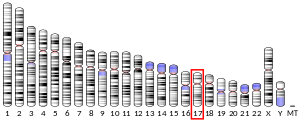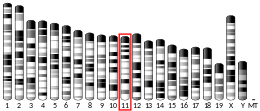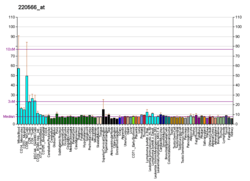PIK3R5
Phosphoinositide 3-kinase regulatory subunit 5 is an enzyme that in humans is encoded by the PIK3R5 gene.[5][6]
Interactions
PIK3R5 has been shown to interact with PIK3CG.[5]
gollark: The PotatOS v8.34 irreality amplifier [DATA EXPUNGED] projection into conceptual/linguistic space [REDACTED] permitting possible <SQUARE BRACKETS DELETED> neutralization of ideatic anomalies.
gollark: Of course, they could fail, so we have orbital recreational nukes standing by.
gollark: Orbital laser strikes *should* be able to neutralize whom.
gollark: The one we call "whom" cannot be tolerated any more. It is time for indecisive action.
gollark: Yes.
References
- GRCh38: Ensembl release 89: ENSG00000141506 - Ensembl, May 2017
- GRCm38: Ensembl release 89: ENSMUSG00000020901 - Ensembl, May 2017
- "Human PubMed Reference:". National Center for Biotechnology Information, U.S. National Library of Medicine.
- "Mouse PubMed Reference:". National Center for Biotechnology Information, U.S. National Library of Medicine.
- Brock C, Schaefer M, Reusch HP, Czupalla C, Michalke M, Spicher K, Schultz G, Nurnberg B (Jan 2003). "Roles of G beta gamma in membrane recruitment and activation of p110 gamma/p101 phosphoinositide 3-kinase gamma". J Cell Biol. 160 (1): 89–99. doi:10.1083/jcb.200210115. PMC 2172741. PMID 12507995.
- "Entrez Gene: PIK3R5 phosphoinositide-3-kinase, regulatory subunit 5, p101".
Further reading
- Johnson C, Marriott SJ, Levy LS (2007). "Overexpression of p101 activates PI3Kgamma signaling in T cells and contributes to cell survival". Oncogene. 26 (49): 7049–57. doi:10.1038/sj.onc.1210504. PMID 17486067.
- Rual JF, Venkatesan K, Hao T, et al. (2005). "Towards a proteome-scale map of the human protein-protein interaction network". Nature. 437 (7062): 1173–8. doi:10.1038/nature04209. PMID 16189514.
- Suire S, Coadwell J, Ferguson GJ, et al. (2005). "p84, a new Gbetagamma-activated regulatory subunit of the type IB phosphoinositide 3-kinase p110gamma". Curr. Biol. 15 (6): 566–70. doi:10.1016/j.cub.2005.02.020. PMID 15797027.
- Voigt P, Brock C, Nürnberg B, Schaefer M (2005). "Assigning functional domains within the p101 regulatory subunit of phosphoinositide 3-kinase gamma". J. Biol. Chem. 280 (6): 5121–7. doi:10.1074/jbc.M413104200. PMID 15611065.
- Gerhard DS, Wagner L, Feingold EA, et al. (2004). "The status, quality, and expansion of the NIH full-length cDNA project: the Mammalian Gene Collection (MGC)". Genome Res. 14 (10B): 2121–7. doi:10.1101/gr.2596504. PMC 528928. PMID 15489334.
- Strausberg RL, Feingold EA, Grouse LH, et al. (2003). "Generation and initial analysis of more than 15,000 full-length human and mouse cDNA sequences". Proc. Natl. Acad. Sci. U.S.A. 99 (26): 16899–903. doi:10.1073/pnas.242603899. PMC 139241. PMID 12477932.
- Metjian A, Roll RL, Ma AD, Abrams CS (1999). "Agonists cause nuclear translocation of phosphatidylinositol 3-kinase gamma. A Gbetagamma-dependent pathway that requires the p110gamma amino terminus". J. Biol. Chem. 274 (39): 27943–7. doi:10.1074/jbc.274.39.27943. PMID 10488142.
- Krugmann S, Hawkins PT, Pryer N, Braselmann S (1999). "Characterizing the interactions between the two subunits of the p101/p110gamma phosphoinositide 3-kinase and their role in the activation of this enzyme by G beta gamma subunits". J. Biol. Chem. 274 (24): 17152–8. doi:10.1074/jbc.274.24.17152. PMID 10358071.
This article is issued from Wikipedia. The text is licensed under Creative Commons - Attribution - Sharealike. Additional terms may apply for the media files.




